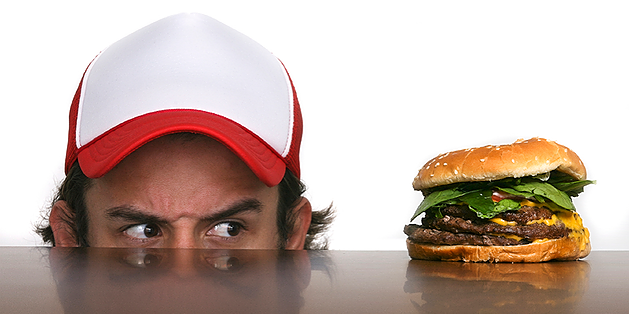Hidden causes of weight gain
Weight gain occurs when you regularly eat more calories than you use through normal bodily functions and physical activity. But the lifestyle habits causing your weight gain aren’t always obvious.
Losing weight means eating fewer calories and burning more energy through physical activity.
It sounds simple. But Canada is considered one of the most overweight countries, with25.8 per centof the population aged 15 and over considered obese. Our lifestyles see many of us eating more calories than we need and not doing enough physical activity.
Do you recognise some of the causes of your weight gain in any of the following?
Food that’s labelled ‘low-fat’
Lots of foods in the supermarkets today are labelled “low-fat”. But there’s a catch. In some cases, low-fat foods contain high levels of sugar. High-sugar foods can also contain lots of calories and so contribute to weight gain.
What can I do?
First, read the labels. Look at the overall energy and calories. Although a food may have a reduced amount of fat, it may still have the same amount of calories.
A food labelled “low-fat” may still contain more calories than an alternative. For example, a “low-fat” muffin may contain more calories than a currant bun.
Stress
It can be easy to reach for a sugary pick-me-up when stressed. Do this often and you may put on weight.
What can I do?
Snack on fruit and veg and other low-calorie options such as plain popcorn, crackers and rice cakes, for example.
And find ways to cope with stress that don’t involve food. Exercise helps promote mental well-being through the release of endorphins, which help to combat stress.
Television
Watching a lot of television can contribute to an inactive lifestyle, and many of us consume calories we don’t need while watching TV.
People often find that while sitting in front of the TV, they snack on energy-dense foods such as crisps and chocolate.
What can I do?
If you’re worried about your weight, take part in more daily physical activity, if your health permits.
Try walking to work, school or the shops and spend less time in front of the TV. Don’t forget that you can do an activity while watching the TV, such as using an exercise bike.
Your medicine cabinet
Weight gain is a common side effect of many drugs. The most common drugs that can cause weight gain are steroids, antipsychotic drugs, and insulin, among others.
What can I do?
Never stop taking prescribed medication unless your family doctor or specialist has told you to.
If you’re concerned about weight gain, talk to your doctor. In the meantime, make sure you’re following a healthy and balanced diet.
Late nights
Research suggests that there is a strong link between lack of sleep and putting on weight.
What can I do?
Simple: get more sleep.
In these modern times, we regard sleep as a waste of time. But sleep is central to good physical and mental health.
Good manners
In an ideal world, friends and family would encourage you to lose extra weight. In reality, they sometimes push you to eat more high-calorie food.
Is it rude not to finish that double helping of chocolate cake at a dinner party? Sometimes it feels that way.
What can I do?
Learn to say “no, thank you” and stick with it. Get used to the idea that it’s OK to leave food on your plate. Soon, friends and family will come to respect your decisions.
Portion sizes
Over the last few decades, the size of portions served in restaurants and supermarket packages has increased.
A study by the World Cancer Research Fund (WCRF) found that burgers, for example, have doubled in size since 1980.
Not surprisingly, research shows that when we’re given a larger portion we tend to eat more.
What can I do?
Coping with larger portion sizes is a matter of stopping when you feel full. Eat slowly and you’ll have a better chance of avoiding that overstuffed feeling.
At home, serve yourself a smaller portion and think about whether you really want a second helping.
Avoid supersizing portions when eating out. You can control portion size and save money when you cook fresh, healthy meals at home.
Learn More
For more information about physical activity, nutrition, and health, the following sources may be helpful.
- Physical activity and your health. Government of Canada. https://www.canada.ca/en/public-health/services/being-active/physical-activity-your-health.html
- Canadian Physical Activity Guidelines. http://www.csep.ca/CMFiles/Guidelines/CSEP_PAGuidelines_adults_en.pdfn.pdf)
- Healthy Eating. Heart and Stroke Foundation of Canada. https://www.heartandstroke.ca/get-healthy/healthy-eating
- Healthy Weight. Heart and Stroke Foundation of Canada. https://www.heartandstroke.ca/get-healthy/healthy-weight
- Healthy Kids. Heart and Stroke Foundation of Canada. https://www.heartandstroke.ca/get-healthy/healthy-kids
- Canada Food Guidelines (updated 2019). https://food-guide.canada.ca/en/
Note: The
contents on Avail such as text, graphics, images, and information is not
intended to be a substitute for professional medical advice, diagnosis, or
treatment. Always seek the advice of your physician or other qualified health
provider with any questions you may have regarding a medical condition. Never
disregard professional medical advice or delay in seeking it because of
something you have read on this or any other website.













